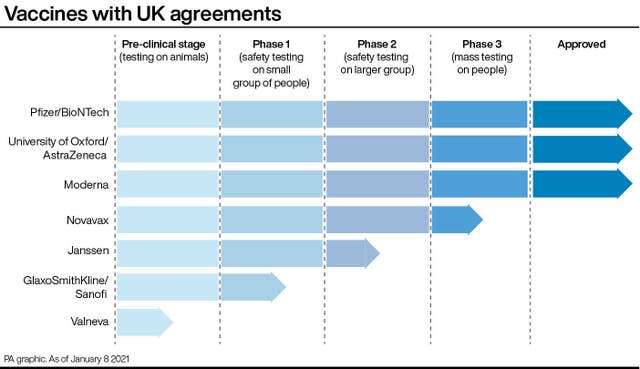UK wants to avoid ‘diplomatic leveraging’ with spare vaccine handouts
The UK will donate its spare Covid-19 vaccines through a global scheme rather than attempt to use the life-saving treatments for “diplomatic leverage” with developing nations, a Government minister has said.
In the lead-up to Friday’s virtual G7 meeting, Boris Johnson has pledged to donate the majority of surplus vaccines to poorer nations.
But James Cleverly, a Foreign Office minister, said it was “difficult to say with any kind of certainty” when Britain would start to hand out excess jabs, with the country’s own vaccine rollout programme still in full flow.
The Prime Minister will chair the online gathering of G7 leaders from Downing Street, including US president Joe Biden in his first major multilateral meeting, to discuss the response to the crisis.
As well as confirming that the UK will share the majority of its surplus coronavirus vaccines with the international Covax initiative, Mr Johnson will also urge fellow leaders to back an ambitious target of supporting the development of vaccines for emerging diseases in 100 days in future – a third of the time it took to successfully develop the Pfizer/BioNTech jab.
Mr Johnson said: “The development of viable coronavirus vaccines offers the tantalising prospect of a return to normality, but we must not rest on our laurels.”
In total, the UK has more than 400 million doses of vaccines on order, enough to vaccinate its population three times over.

Former Conservative Party co-chairman Mr Cleverly said Covax, led by the World Health Organisation and other international bodies, had been nominated to receive any surplus supplies in order to avoid diplomatic wrangling.
Speaking to Times Radio, he said: “We’ve made a very principled and correct decision that the best way of deciding the distribution of the bulk of the vaccine to the world should be done through multilateral bodies rather than using what is potentially a life-saving drug as some form of diplomatic leverage.
“So we’ve decided to go through Covax which is the international body that will decide the best and most equitable distribution.”
But with some vaccines that the UK has ordered yet to be approved by the UK regulator, the Medicines & Healthcare products Regulatory Agency (MHRA), Mr Cleverly could not put a date on when the first Covax donations would be made.
The Government’s current target is to have offered a jab to every adult in the UK by the autumn but, in a sign of the confidence in the current progress rate, the chair of the Vaccines Taskforce Clive Dix said this week that every adult could be given both jabs by August or “maybe sooner”.
Asked when the UK would be in a position to share extra vaccines with poorer countries, Mr Cleverly said it was “difficult to say with any kind of certainty”.
“There are a number of variables, some of which are in our control,” he told BBC Radio 4’s Today.

“The speed of vaccinating our own people for example, which is going very well… other variables include when vaccines get the green light by regulators and how quickly the companies can produce those vaccines.
“We’re not really able to give with certainty either a timescale or the numbers involved.”
Dr Richard Hatchett, chief executive of the Coalition for Epidemic Preparedness Innovations, said surplus vaccines need to be shared with poorer countries “to suppress transmission globally as fast as we can” and stop vaccine-resistant mutations emerging.
He told the BBC: “Many countries, including the UK, will be in a position of oversupply. They have more vaccines than are needed to vaccinate the population.”
Friday’s video conference is the first meeting of G7 leaders since April 2020 and comes ahead of a summit in Cornwall in June.
The Prime Minister will use the meeting to urge the G7, made up of the US, Japan, Canada, Germany, France and Italy along with the UK, to increase funding for Covax.
Decisions on timing and the scale of any surplus will be decided later in the year, although Government sources indicate that well over 50% of excess doses would go to Covax.
It will depend on the reliability of the vaccine supply chain and whether new vaccines are needed for emerging variants or booster shots in the autumn.
The Liberal Democrats are urging the Government not to wait until the whole population has received their jabs to start distributing supplies to developing countries.
The party’s foreign affairs spokeswoman Layla Moran said: “A trickle-down approach to global vaccine distribution risks prolonging the pandemic, giving vaccine-resistant variants a chance to mutate.
“Britain must show global leadership and commit to a parallel rollout – it is both the right and smart thing to do.”
Other issues likely to be on the agenda during the UK’s presidency of the G7 include climate change and the economic recovery from coronavirus.


